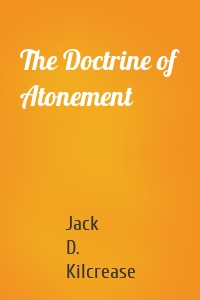Jack D. Kilcrease
2 кн.
The Self-Donation of God
In The Self-Donation of God, Jack Kilcrease argues that the speech-act of promise is always an act of self-donation. A person who unilaterally promises to another is bound to take a particular series of actions to fulfill that promise. Being that creation is grounded in God's promising speech, the divine-human relationship is fundamentally one of divine self-donation and human receptivity. Sin disrupts this relationship and therefore redemption is constituted by a reassertion of divine...
| Автор | Jack D. Kilcrease |
The Doctrine of Atonement
Post-Enlightenment theology has frequently rejected the historic Christian doctrine of substitutionary atonement. For theologians standing in the tradition of the Lutheran Confessions, rejection of substitutionary atonement is particularly problematic because it endangers the unconditional nature of the justification through faith. If one rejects vicarious satisfaction, then the only alternative is to make redemption dependent on what sinners do for themselves. In this study, Jack Kilcrease...
| Автор | Jack D. Kilcrease |



